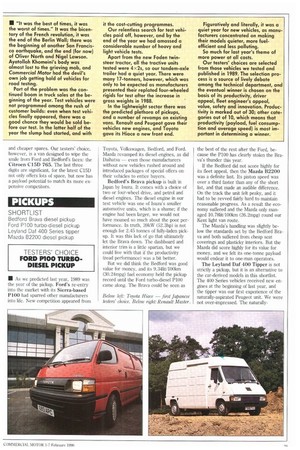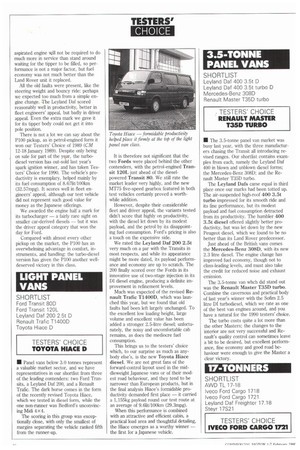• As we predicted last year, 1989 was the year
Page 41

Page 42

If you've noticed an error in this article please click here to report it so we can fix it.
of the pickup. Ford's re-entry into the market with its Sierra-based P100 had spurred other manufacturers into life. New competition appeared from Toyota, Volkswagen, Bedford, and Ford. Mazda revamped its diesel engines, as did Daihatsu — even those manufacturers without new vehicles rushed around and introduced packages of special offers on their vehicles to entice buyers.
Bedford's Brava pickup is built in Japan by lsuzu. It comes with a choice of two or four-wheel drive, and petrol and diesel engines. The diesel engine in our test vehicle was one of Isuzu's smaller automotive units, which is a shame; if the engine had been larger, we would not have moaned so much about the poor performance. In truth, 39kW (52.3hp) is not enough for 2.45 tonnes of fully-laden pickup. It was this lack of go that ultimately let the Brava down. The dashboard and interior trim is a little spartan, but we could live with that if the productivity (read performance) was a bit better.
But we did think the Bedford was good value for money, and its 9.341it/100km (30.24mpg) fuel economy held the pickup record until the Ford turbo-diesel P100 came along. The Brava could be seen as Below left: Toyota Hiace — first Japanese testers' choice. Below right: Renault Master. the best of the rest after the Ford, because the P100 has clearly stolen the Brava's thunder this year.
If the Bedford did not score highly for its fleet appeal, then the Mazda B2200 was a definite last. Its piston speed was over a third faster than any of the short list, and that made an audible difference. On the track the unit felt peaky, and it had to be revved fairly hard to maintain reasonable progress. As a result the economy suffered and the Mazda only managed 10.78R/100km (26.2mpg) round our Kent light van route.
The Mazda's handling was slightly below the standards set by the Bedford Brava and both suffered from cheap seat coverings and plasticky interiors. But the Mazda did score highly for its value for money, and we felt its one-tonne payload would endear it to one-man operators.
The Leyland Oaf 400 Tipper is not strictly a pickup, but it is an alternative to the car-derived models in this shortlist. The 400 Series vehicles received new engines at the beginning of last year, and the tipper was our first experience of the naturally-aspirated Peugeot unit. We were not over-impressed. The naturally aspirated engine will not be required to do much more in service than stand around waiting for the tipper to be filled, so performance is not a major factor, but fuel economy was not much better than the Land Rover unit it replaced.
All the old faults were present, like the steering weight and bouncy ride: perhaps we expected too much from a simple engine change. The Leyland Daf scored reasonably well in productivity, better in fleet engineers' appeal, but badly in driver appeal. Even the extra mark we gave it for its tipper body could not get it into pole position.
There is not a lot we can say about the P100 pickup, as in petrol-engined form it won our Testers' Choice of 1989 (CM 12-18 January 1989). Despite only being on sale for part of the mr, the turbodiesel version has out-sold last year's spark ignition winner, and has taken Testers' Choice for 1990. The vehicle's productivity is exemplary, helped mainly by its fuel consumption of 8.67lit/100krn (32.57mpg). It scores well in fleet engineers' appeal, although our test vehicle did not represent such good value for money as the Japanese offerings.
We awarded the engine half a mark for its turbocharger — a fairly rare sight on smaller car-derived diesels — but it was the driver appeal category that won the day for Ford.
Compared with almost every other pickup on the market, the P100 has an overwhelming advantage in comfort, instruments, and handling: the turbo-diesel version has given the P100 another welldeserved victory in this class.
































































































































